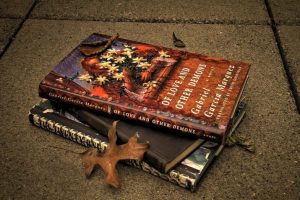Faking Normal is a series written by guest blogger J, an adult on the autism spectrum. Her other articles can be found here.
Growing up, I was something of a pathological liar. I would say anything that popped into my head with very little thought as to whether or not it was the truth. I’ve since grown out of that, but the rationale behind my childhood lies is not what you’d expect. I never lied maliciously or to get attention; I lied because often the truth is just so freaking boring. Getting a papercut is boring. Getting cut by a man with a knife who was trying to steal my dog is interesting. I’d rather hear about the man with the knife, so I told stories like that. Who wants to hear about a papercut? Yawn.
For that same reason, I love reading and watching fiction. The non-fiction section of Barnes & Noble might as well not exist for me. Anything that starts off, “After the fall of Babylon in 539 BC…” has already lost my attention unless it’s a prelude to time travel or illicit Mesopotamian affairs.
This puts me at odds with most of my fellow autistic people, many of whom have zero use for fiction. Biographies, documentaries, historical theories, that’s where the good stuff is, according to most of us. I could not agree less. Yes, I’ve read way more than makes sense about some topics, like pirates, and that’s non-fiction, but I’d rather watch Errol Flynn do his swashbuckling thing, historically inaccurate as it may be. Put me in front of a historical documentary on fighter pilots throughout history, and you should also give me toothpicks to prop my eyelids open.
A couple of weeks ago, I had a series of really bad things happen to me all at once. One of my closest friends, who also has ASD, was an amazing source of comfort during that time, and because I can be sort of manipulative, I leveraged the whole “Poor Me!” factor into getting him to watch Mean Girls with me. He’s very into non-fiction, especially historical documentaries, I’m sure he was miserable the whole time, but he stuck it out, and I loved him for it.
There’s some give and take when it comes to fact versus fiction in entertainment, and I watched a documentary on people who dress up as unicorns that my friend wanted to see. Not like for Halloween or for special occasions… They just dress as unicorns at all times. For me, watching a TV show about actual people feels invasive and isn’t all that interesting. I hate reality TV for the same reason I don’t like historical documentaries. I don’t want to keep up with the Kardashians (We’re serious businesswomen! And now we’re naked on the internet!) any more than I want to see analysis of how dinosaurs and birds might be related, or they might not be, and it takes forever and ever to not actually reach a conclusion.
My favorite fiction has a philosophical bent. My master’s degree is in analytic philosophy of language because I love the idea that there can be truth hidden in made-up stories. Sometimes, that makes esoteric concepts more accessible and open to interpretation than just putting ideas out there. For me, anyway. I do also understand that there are people, especially those with ASD, who just want the bald facts without any surrounding fictional plot.
So, whether you prefer fact or fiction, a huge part of faking normal is making a real effort to understand the preferences of other people and trying to appreciate (or at least stay awake) when they have something that’s important to them. That goes for relating to neurotypical people as well as to people with autism, though autistics do tend to be more polarized.
I do not care about the Mongols, but I know that Genghis Khan founded the largest contiguous empire in history. My friend does not care about Regina George, but he knows that on Wednesdays, we wear pink. That’s a huge component in fitting in – faking it until you make it. And even if you can never bring yourself to genuinely care about fact or fiction, you can at least make another person feel like their passion matters to you. And that’s huge.


